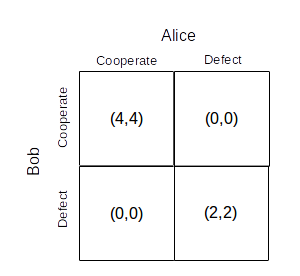Nash Equilibrium
How many Nash equilibria does the following game have? Assume that we restrict ourselves to pure strategies (that is, each agent can only pick exactly one strategy).

The answer is 2.
This section requires Javascript.
You are seeing this because something didn't load right. We suggest you, (a) try
refreshing the page, (b) enabling javascript if it is disabled on your browser and,
finally, (c)
loading the
non-javascript version of this page
. We're sorry about the hassle.
Both C/C and D/D are pure strategy Nash equilibriums, since changing one's behavior (while the other person stays the same) would mean giving up something (4 or 2) to get nothing (0).